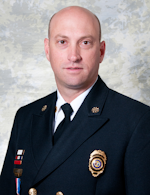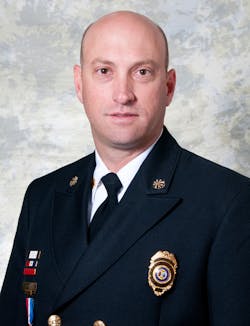I realize that some of you may be quick to flip past this article each month because you aren’t involved in politics or you think politics doesn’t impact you. Well, you should be involved and you are impacted. No matter your current involvement in this realm, I hope you pause long enough to realize that there IS a way for you to get involved and, most importantly, that the citizens and fire service depend on you to do so.
Early involvement
Thinking back to my days as a career company officer, I consider what made me—a lieutenant in a mid-size suburban fire department—attend political hearings at the State Capitol. I was involved in the community where I lived because I cared about the community and wanted to make a difference. Also, at the time, there was a captain of a large metro fire department who was a state representative, and this intrigued me. There was also a volunteer fire department assistant chief who was active in the county fire association and county politics. In short, I was blessed with a lot of good role models with care and influence.
Another important factor: I served in a fire department that required me as a company officer to be a state-certified fire inspector. This requirement not only helped me serve the citizens and businesses in a manner that focused on saving lives and reducing property damage, it also got the entire department engaged in the community on almost every shift. As the National Fallen Firefighter Foundation (NFFF) Fire and Life Safety Initiatives promote, we made every day a training day for the entire company. We spent plenty of time in the buildings where we reset an automatic fire alarm, just as we did in the buildings where we made long hose stretches or performed a rescue of an employee from a piece of industrial equipment.
The mandate to be a state-certified fire inspector also made us aware of the standards for training as well as the politics that went into adopting the standards that made our jobs safer at the local, state and federal level. Should we adopt NFPA 1500 at the local level? What about NFPA 1710 or NFPA 1720 at the state level? Are we adopting the latest version of NFPA 13, 13R and 13D?
What was real for everyone then and now is that the issues at hand had an impact on the citizens we were sworn to protect—and also on our fellow firefighters.
Modern problems
I have never seen standards and fire and building codes under attack like they are today. What’s worse is they are under attack by the uninformed and influenced by ignorance. The actions to soften the International Building Code, Fire Code and especially the International Residential Code will have a big impact on how we fight fire in the built environment today and for the remainder of even the youngest readers’ careers.
What about presumptive cancer bills? The fires in the built environment are impacting our cancer rate. The number of fires is increasing because of the pure volume of the housing stock, just as the number of EMS calls is going up with population growth and an aging population.
How will you engage?
Will you engage in the fire attack? Better yet, let’s take a long-forgotten political approach and be diplomatic and civil. Can we bring back the debates over issues that are productive and focused on a good outcome for the citizens and firefighters? Perhaps this will help a new generation get involved. I know it helped me. On that note, thank you to everyone who gave me an opportunity to engage in politics at the local, state and national level, and to begin my involvement at a very young age and early in my career.
A fire service friend from Michigan recently invited me to speak, and he recommended that the title of my presentation be “Where do you go from here?” Let’s make that future one that finds us ready to engage in both the fire attack and the fire politics. Until next time, stay safe and engage in the politics of life safety.
Pull Quote:
Standards and fire and building codes are under attack by the uninformed and influenced by ignorance.

Shane Ray
SHANE RAY has been a volunteer firefighter since 1984 and a career firefighter since 1994. He has also served as a mayor for six years and the Tennessee Fire Chief’s Legislative Chairman for 12 years. Ray’s love for politics started as fire chief of the Pleasant View Volunteer Fire Department in Tennessee, where he served 13 years. He then served under Governor Nikki Haley in South Carolina as superintendent and state fire marshal. He currently serves as the president of the National Fire Sprinkler Association and is a lifetime member of the Pleasant View Volunteer Fire Department. Throughout his career, he has been committed to public service with a “Do It Different” mentality and that all stakeholders are important.






